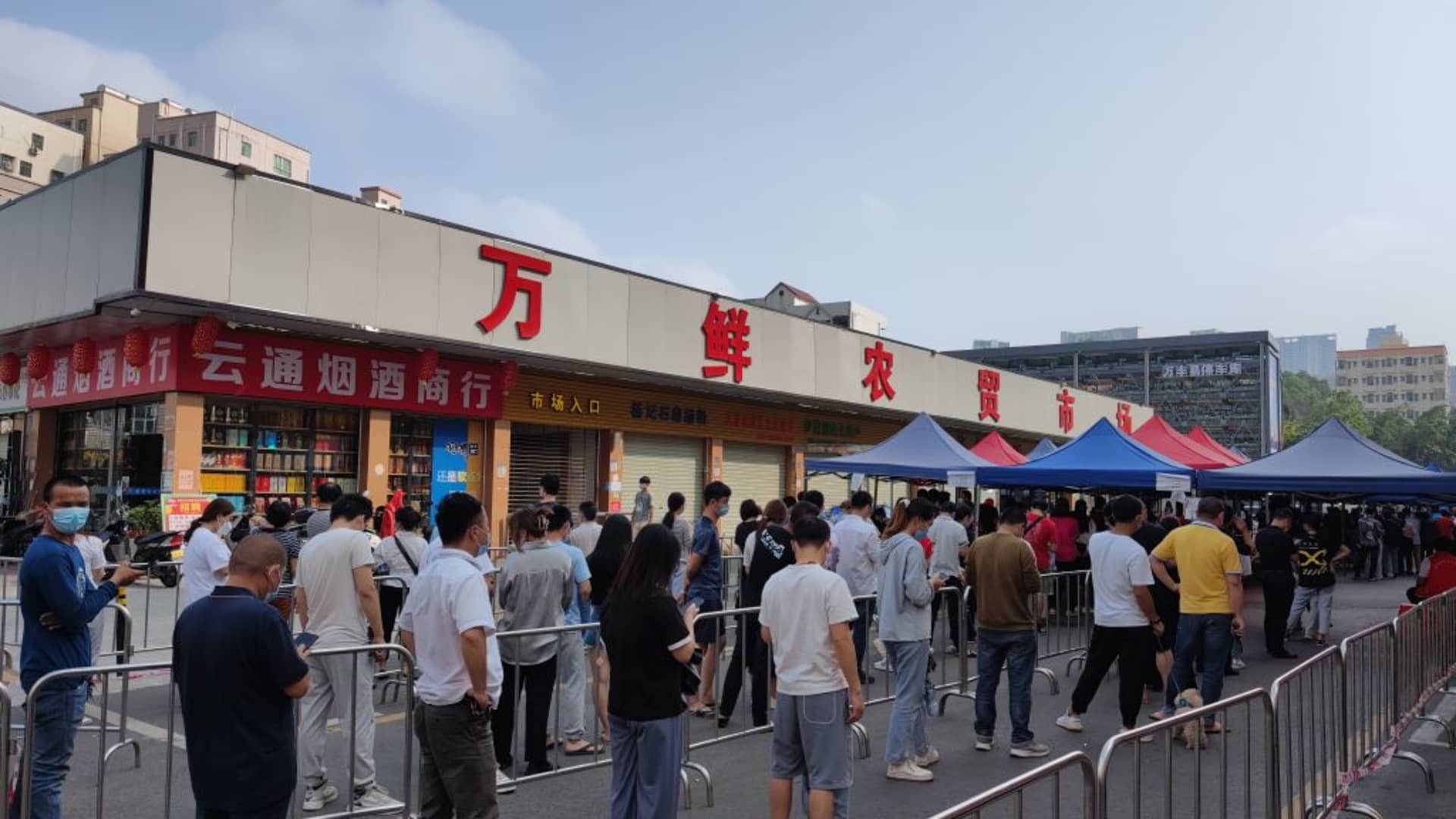
People line up for nucleic acid testing at a temporary Covid-19 testing site on March 22, 2022 in Shenzhen, Guangdong Province of China.
Vcg | Visual China Group | Getty Images
BEIJING — As mainland China battles its worst Covid-19 outbreak since early 2020, local governments increasingly say the new omicron BA.2 variant is to blame.
That’s the new Covid subvariant, which preliminary research indicates is even more transmissible than the original omicron variant — but doesn’t necessarily cause more severe illness.
Mainland China has reported well over 1,000 new confirmed Covid cases a day since March 12, with the number holding above 2,000 for the last three days. That’s not including the asymptomatic case count, which can be just as many, or far more, than the number of daily confirmed cases.
From the northern province of Jilin — which accounts for more than half of the new daily cases — to industrial centers like Tangshan and Shenzhen, local authorities have blamed omicron BA.2 for the latest wave of Covid.
“Omicron BA.2 caused this outbreak, and spreads faster and more easily than previous viruses,” the export-heavy province of Fujian said in an online statement Tuesday, according to a CNBC translation of the Chinese text.
The subvariant is also “stealthier” and harder to find, but infections are primarily mild or asymptomatic cases, the Fujian government said.
Scientists have also described BA.2 as a “stealth” variant because it contains mutations that could make it harder to distinguish from the older delta variant using PCR tests.
Despite apparent changes in the virus’ severity, China has maintained its stringent zero-Covid policy of using swift, regional lockdowns to control outbreaks. The strategy had helped the economy quickly return to growth after the initial shock of the pandemic in early 2020.
Different provinces or cities can impose quarantines or travel restrictions on people coming from other regions, or at least require valid virus tests, adding hurdles to commercial travel.
For example, a company had to change its truck driver to a local one before the vehicle entered a city in the Guangxi region, said Klaus Zenkel, chair of the south China chapter of the EU Chamber of Commerce in China. “Otherwise he cannot enter the area where he needs to deliver the goods to.”
Zenkel is based in the southern city of Shenzhen, which ended a week-long lockdown Sunday night.
“If you compare this lockdown for the seven days last week, 14 to 21 of March, it was almost tougher than two years ago when the pandemic started,” he said, referring to the tighter government restrictions on international travel and stay-home policies.
Smaller businesses hurt more
More than half of mainland China shut down in February 2020 for an extended Lunar New Year holiday in an effort to control the initial outbreak of Covid-19 in the country. The economy contracted that quarter, but quickly rebounded.
This time around, multinational corporations could maintain production by keeping workers in the same area as factories, but smaller businesses lost a week of output, Zenkel said Wednesday. He said district governments are asking businesses to share what their losses were, for potential compensation plans.
Shenzhen is pretty much returning to normal, but many people were still getting tested every day so they could present valid negative results as needed for in-person business meetings, he said. “Let’s hope [with] all these experiences and all the China data, the Chinese government can find a way to go from zero-Covid to ‘live with Covid.'”
Across the country, Covid tests remain a primary way for authorities to confirm whether people are allowed into a city or whether a neighborhood can end its lockdown. These tests — which can’t yet be self-administered at home — now only cost about 8 yuan ($1.25) in Beijing, or free if arranged by community leaders.
At a Shanghai city press briefing Wednesday, Wu Fan, deputy dean of Shanghai Medical College at Fudan University, emphasized the need for the public to maintain social distancing, comply with testing and health code checks, and monitor themselves carefully.
“This time, the omicron BA.2 variant seems to be running very quickly,” Wu said, according to CNBC translation of the Chinese remarks. “Just chasing it isn’t enough. [We] also need to cut off the path ahead of it.”







